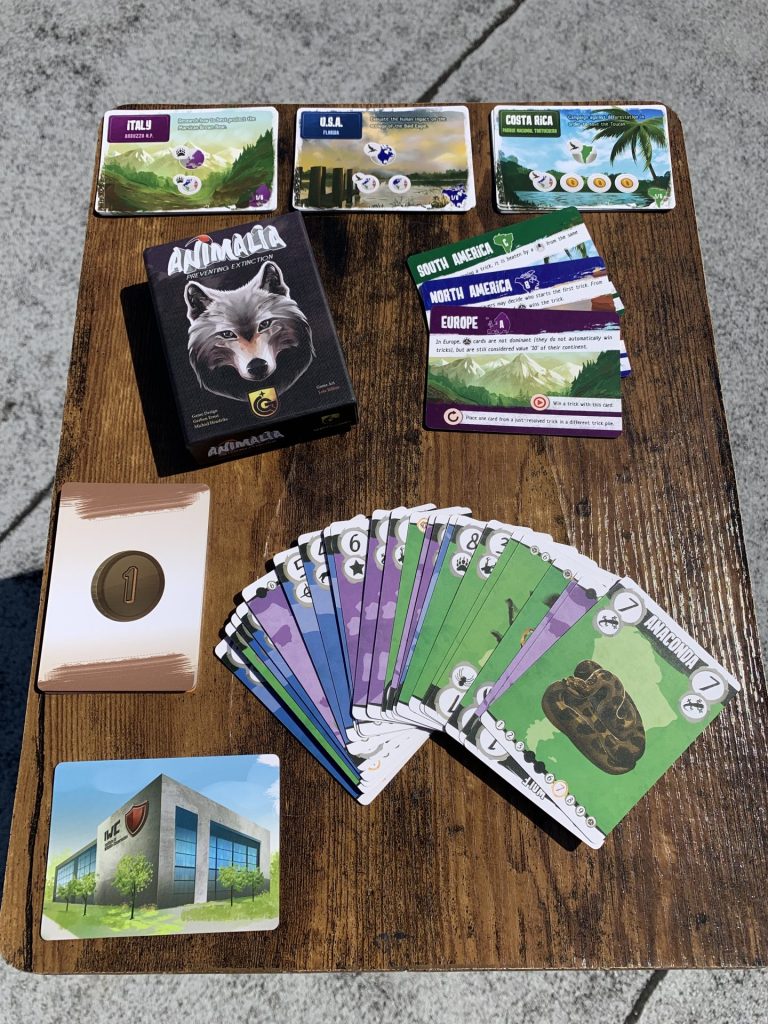I generally try to avoid panning games. Unless a title is morally abhorrent, or a lavish production with undercooked mechanics, the hobby is small enough and scrappy enough that slamming a published game is not high on my list of priorities. People work hard creating games, even if they’re bad.
There are three alternatives that I’ve found thus far in my time as a reviewer. The first is spending most of the review talking about another game that does the same thing better. I chose this option while reviewing Coyote. Were I to pursue the same tact here, I would start by saying that Animalia: Preventing Extinction is a non-descript cooperative trick-taking game, and then talk about The Crew, a sublime cooperative trick-taking game.
The second alternative is finding something interesting to expound upon about the ways in which the game either does or doesn’t work. You can see my review of So Clover! for an example. I enjoy writing those sorts of reviews. Spending the time and the thought feels like respecting the work the designers and artists put into the game, and there’s a lot to learn from picking apart what doesn’t work. “Why is it bad?” is a more interesting question than “Is it bad?” Were I to write about Animalia: Preventing Extinction in this way, I would probably look at how the abilities on some of the cards, activated when you play them in a trick, deflate the tension of the game.
Option three is to get weird. I briefly experimented with that option for this review. I wrote a substantial portion of a Socratic dialogue between myself and Jiminy Cricket, who had walked into the room to remind me that I needed to write a review in exchange for the copy publisher Quined Games had sent me. Desperate times call for desperate measures.
 As you can see, I have not opted for any of these. Sometimes, as with Animalia: Preventing Extinction, a game doesn’t give you much to talk about. This one is a cooperative trick taking game where players are attempting to collect money and/or data on different species in different parts of the world. Goal requirements vary, but the general idea is as follows: I need to research canines, so I need to win two canine cards, one of which has to be in the purple (European) suit. That’s not very interesting, but that’s fine. I don’t need a trick-taking game to have an evocative theme. The Crew may as well not have a theme, and it’s one of the all-time greats.
As you can see, I have not opted for any of these. Sometimes, as with Animalia: Preventing Extinction, a game doesn’t give you much to talk about. This one is a cooperative trick taking game where players are attempting to collect money and/or data on different species in different parts of the world. Goal requirements vary, but the general idea is as follows: I need to research canines, so I need to win two canine cards, one of which has to be in the purple (European) suit. That’s not very interesting, but that’s fine. I don’t need a trick-taking game to have an evocative theme. The Crew may as well not have a theme, and it’s one of the all-time greats.
The problem, then, is that the gameplay simply isn’t interesting. Trick taking games have to have a twist, and the twist here is that many of the cards have abilities that trigger either when they are played or when the trick resolves. Some raise funds, some let you swap played or unplayed cards around the table. I tried Animalia solo, I played it with the default two players, and I played it with three. It was never challenging. It was never interesting. There were obvious correct cards to play. Even if you mess up, which is unlikely, the game comes with too many undo buttons. It’s like stepping up to walk a tightrope only to find that you’ll be walking across an airplane runway.
The writers at Meeple Mountain talk off and on about the fact that board game reviewers have to get more comfortable with saying that a game isn’t good. Though I will always prefer to say so while drawing what value I can from a play experience, I fundamentally agree. Animalia: Preventing Extinction is not good, and, more importantly, it’s not particularly interesting in any of the ways that it fails. Sometimes a game doesn’t give you much to talk about.











Add Comment